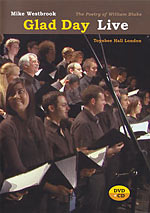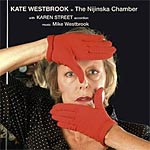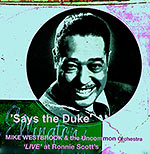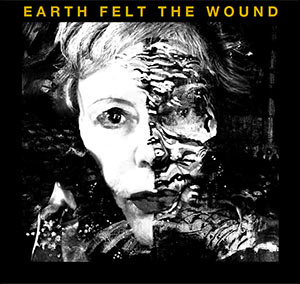Kate Westbrook
"Emerge from Toynbee Hall on Commercial Street, London E1, the venue where the works on this album were performed and recorded, and you walk into the streets of William Blake's real life and imagination.
You see, feel and hear the same places that Blake knew, loved hated and dreamed of being transformed into an earthly paradise and revolutionary Jerusalem.
It is still Blake's city, cut through by the streets where he listened to every sound: "In every cry of every man / In every infant's cry of fear, / In every voice in every ban / The mind-forg'd manacles I hear."
Mike Westbrook's notes in this live version of his homage to Blake, Glad Day, (first waxed in 1997 with a seven piece brass band and singers Kate Westbrook and Phil Minton) hold Blake's insurgent spirit, his love for humanity and his understanding of its oppression, and with his tunes and musical brain, Westbrook brings Blake's words into union with the life-force of the blues.
For if Blake had been born in the US South he would have hollered the blues and breathed the breath of jazz.
Read Holy Thursday again, know the injustice that it describes and feel its truth: "Is that trembling cry a song? / Can it be a song of joy? / And so many children poor / It is a land of poverty!"
Or in the Con-Dem land in which we live: "Is this a holy thing to see / In a rich and fruitful land, / Babes reduced to misery / Fed with a cold and usurous hand?"
Blake in the land of Wonga and X-Factor, where the gulf between rich and poor widens every day, where learning about the world is not curcumscribed by curiosity, compassion and a human urge for betterment, but by school and examination league tables and the worst cuture of obedience and copy-catting.
Adrian Mitchell wrote of Blake that he was "Unfashionable but politically dangerous. Frankly oposed to all kings, warriors and priests, he was tried for sedition in 1804 and was lucky to escape with his life."
For this performance Minton and Kate are with Westbrook and his piano. Karen Street plays accordion, Billy Thompson violin and Steve Berry bass with the London College of Music Choir, conducted by Paul Ayres. The arrangements are by Mitchell and Kate.
On London Song the humming choir and Westbrook's almost doodling piano subside to a haunting duet between Street and Berry, all a prelude to Kate's icily lucid vocal truly running "in blood down palace walls."
Thompson's violin cries out in outrageous beauty as Minton sings of the freed slave, "his chains are loose, his dungeon doors are open... for empire is no more."
Kate and Minton's voices turn to tenderness and Street's accordion sways through Lullaby.
Pain and empathy rise through Westbrook’s solo piano through the long introduction to Holy Thursday before Kate’s vocal of cool anger and Street’s singing and airy keys take us directly into Blake’s world of 2014.
Blake’s contrasts are harmonised in The Tyger and the Lamb firstly by Berry’s pulsating, delving bass and then by a host of women’s voices and the power of Street’s astonishing accordion.
She is there too at the outset of A Poison Tree, spectral, menacing and full of portent before Kate’s own ominous vocal and Thompson’s grim, dancing solo.
The blues are in Whitechapel and all through Long John Brown and Little Mary Bell, Minton’s growling voice and Westbrook’s aching piano tell the story of the Devil’s spoliation of love before Thompson’s bow adds its shimmering tailpiece.
Berry’s long, thudding then mercurial solo and Thompson’s wailing violin introduce the key opening lines of The Human Abstract: “Pity would be no more / If we did not make somebody poor,” then straight on to The Fields and Blake’s clearest vision of a socialist Jerusalem in the very heart of London’s rare green spaces: “Mutual shall build Jerusalem / Both heart in heart and hand in hand.”
It makes me remember the Westbrooks, Minton, the great trombonist Paul Rutherford and the Brass Band playing at the E1 Festival on Bigland Green, Stepney E1 in 1975.
Blake would have loved it and would have joined in too, with children singing, dancing and writing poems.
Long live his vision, insights and the beautiful sounds of the Westbrooks - all interlaced, all of a piece, all one."
Chris Searle - Morning Star
You see, feel and hear the same places that Blake knew, loved hated and dreamed of being transformed into an earthly paradise and revolutionary Jerusalem.
It is still Blake's city, cut through by the streets where he listened to every sound: "In every cry of every man / In every infant's cry of fear, / In every voice in every ban / The mind-forg'd manacles I hear."
Mike Westbrook's notes in this live version of his homage to Blake, Glad Day, (first waxed in 1997 with a seven piece brass band and singers Kate Westbrook and Phil Minton) hold Blake's insurgent spirit, his love for humanity and his understanding of its oppression, and with his tunes and musical brain, Westbrook brings Blake's words into union with the life-force of the blues.
For if Blake had been born in the US South he would have hollered the blues and breathed the breath of jazz.
Read Holy Thursday again, know the injustice that it describes and feel its truth: "Is that trembling cry a song? / Can it be a song of joy? / And so many children poor / It is a land of poverty!"
Or in the Con-Dem land in which we live: "Is this a holy thing to see / In a rich and fruitful land, / Babes reduced to misery / Fed with a cold and usurous hand?"
Blake in the land of Wonga and X-Factor, where the gulf between rich and poor widens every day, where learning about the world is not curcumscribed by curiosity, compassion and a human urge for betterment, but by school and examination league tables and the worst cuture of obedience and copy-catting.
Adrian Mitchell wrote of Blake that he was "Unfashionable but politically dangerous. Frankly oposed to all kings, warriors and priests, he was tried for sedition in 1804 and was lucky to escape with his life."
For this performance Minton and Kate are with Westbrook and his piano. Karen Street plays accordion, Billy Thompson violin and Steve Berry bass with the London College of Music Choir, conducted by Paul Ayres. The arrangements are by Mitchell and Kate.
On London Song the humming choir and Westbrook's almost doodling piano subside to a haunting duet between Street and Berry, all a prelude to Kate's icily lucid vocal truly running "in blood down palace walls."
Thompson's violin cries out in outrageous beauty as Minton sings of the freed slave, "his chains are loose, his dungeon doors are open... for empire is no more."
Kate and Minton's voices turn to tenderness and Street's accordion sways through Lullaby.
Pain and empathy rise through Westbrook’s solo piano through the long introduction to Holy Thursday before Kate’s vocal of cool anger and Street’s singing and airy keys take us directly into Blake’s world of 2014.
Blake’s contrasts are harmonised in The Tyger and the Lamb firstly by Berry’s pulsating, delving bass and then by a host of women’s voices and the power of Street’s astonishing accordion.
She is there too at the outset of A Poison Tree, spectral, menacing and full of portent before Kate’s own ominous vocal and Thompson’s grim, dancing solo.
The blues are in Whitechapel and all through Long John Brown and Little Mary Bell, Minton’s growling voice and Westbrook’s aching piano tell the story of the Devil’s spoliation of love before Thompson’s bow adds its shimmering tailpiece.
Berry’s long, thudding then mercurial solo and Thompson’s wailing violin introduce the key opening lines of The Human Abstract: “Pity would be no more / If we did not make somebody poor,” then straight on to The Fields and Blake’s clearest vision of a socialist Jerusalem in the very heart of London’s rare green spaces: “Mutual shall build Jerusalem / Both heart in heart and hand in hand.”
It makes me remember the Westbrooks, Minton, the great trombonist Paul Rutherford and the Brass Band playing at the E1 Festival on Bigland Green, Stepney E1 in 1975.
Blake would have loved it and would have joined in too, with children singing, dancing and writing poems.
Long live his vision, insights and the beautiful sounds of the Westbrooks - all interlaced, all of a piece, all one."
Chris Searle - Morning Star
"Every time Mike Westbrook records Glad Day - his much-loved settings of William Blake for two solo voices, choir and ensemble the instrumentation becomes smaller as the vision grows grander. True enough, those who value Westbrook as foremost a 'jazz composer' - many say Britain's greatest - might regret the jettisoning of big-band splendour that fuelled his original grand design in 1980. A 1997 remake stripped the scoring back to three saxophones and rhythm section, and this new version, recorded live in 2008, reduces further: violin, accordion, acoustic bass and Westbrook's piano now carry the weight of material once propped up by an Ellingtonian-size big band.
But, as Blake said, fire will find its form, and this Glad Day represents the perfect convergence of content and form. Violin, accordion and bass put you in mind of Kurt Weill or of Stravinsky's Soldier's Tale, and this playful fantasy of an imaginary folk group is a powerful one - a troupe of minstrels from Blake's own time who have somehow managed to sneak back through a time portal to the modern age.
Vocalists Phil Minton and Kate Westbrook (Mike's wife) have been with the project in all of its various incarnations, and through their onstage personae Blake's poetic imagery is reborn. Minton owns one of the most astonishing vocal instruments around. In 'The Fields' his quivering, resonant bel canto injects the music with extatic exhilaration, a little danger even. On 'Long John Brown and Little Mary Bell' he lets rip with his trademark improvised, abstract yodelling vocalisations: an unshakable force of nature. Kate Westbrook has a jazz singer's impulse for tonal inflection and rhythmic elasticity combined with the deportment of a great actress.
'London Song' begins with a representation of chaos: vocal whispers and muffled cries from the London College of Music's Chamber Choir which meander urgently towards an anchoring tonality. Westbrook's choral writing is stylistically apposite, pitching up somewhere between formal hymnody and hot gospel - 'I see thy form' subtly acknowledges 'Jerusalem' while 'The Tyger and the Lamb' is kept merrily on the boil over Steve Berry's brawny, swingy bass vamp. Billy Thompson's extended violin solos are a joy throughout. Westbrook's jazz roots are clear; and Blake's images burn as bright as fire."
Philip Clark - Gramophone
But, as Blake said, fire will find its form, and this Glad Day represents the perfect convergence of content and form. Violin, accordion and bass put you in mind of Kurt Weill or of Stravinsky's Soldier's Tale, and this playful fantasy of an imaginary folk group is a powerful one - a troupe of minstrels from Blake's own time who have somehow managed to sneak back through a time portal to the modern age.
Vocalists Phil Minton and Kate Westbrook (Mike's wife) have been with the project in all of its various incarnations, and through their onstage personae Blake's poetic imagery is reborn. Minton owns one of the most astonishing vocal instruments around. In 'The Fields' his quivering, resonant bel canto injects the music with extatic exhilaration, a little danger even. On 'Long John Brown and Little Mary Bell' he lets rip with his trademark improvised, abstract yodelling vocalisations: an unshakable force of nature. Kate Westbrook has a jazz singer's impulse for tonal inflection and rhythmic elasticity combined with the deportment of a great actress.
'London Song' begins with a representation of chaos: vocal whispers and muffled cries from the London College of Music's Chamber Choir which meander urgently towards an anchoring tonality. Westbrook's choral writing is stylistically apposite, pitching up somewhere between formal hymnody and hot gospel - 'I see thy form' subtly acknowledges 'Jerusalem' while 'The Tyger and the Lamb' is kept merrily on the boil over Steve Berry's brawny, swingy bass vamp. Billy Thompson's extended violin solos are a joy throughout. Westbrook's jazz roots are clear; and Blake's images burn as bright as fire."
Philip Clark - Gramophone
Filmed and recorded in concert at Toynbee Studios, London, Saturday 6th December 2008 .
CD Version of track 5, The Tyger and the Lamb, recorded Sunday 7th December 2008.
Concert promoted by Artsadmin.
Filmed by Mike Dibb and Jon Hiseman with Tomo Brody and Sebastian Derwisinski
Edited by David Martin
Sound recording by Miles Ashton
Mixed by Jon Hiseman at Temple Music
Concert sound: William Strode, Paul Sparrow and Chief Dawethi
DVD/CD design by Ingo Wulff
Supported by Airshaft Trust
with thanks to Adrian and Julia Mann, Celia Mitchell, Peter Conway, Bob Baker,
Judith Knight, The Simon Community
Dedicated to the memory of Adrian Mitchell 1932 - 2008
Westbrook Records: WR002DVD-5 WR002CD-2
More information about Glad Day
CD Version of track 5, The Tyger and the Lamb, recorded Sunday 7th December 2008.
Concert promoted by Artsadmin.
Filmed by Mike Dibb and Jon Hiseman with Tomo Brody and Sebastian Derwisinski
Edited by David Martin
Sound recording by Miles Ashton
Mixed by Jon Hiseman at Temple Music
Concert sound: William Strode, Paul Sparrow and Chief Dawethi
DVD/CD design by Ingo Wulff
Supported by Airshaft Trust
with thanks to Adrian and Julia Mann, Celia Mitchell, Peter Conway, Bob Baker,
Judith Knight, The Simon Community
Dedicated to the memory of Adrian Mitchell 1932 - 2008
Westbrook Records: WR002DVD-5 WR002CD-2
More information about Glad Day
Kate Westbrook Recordings
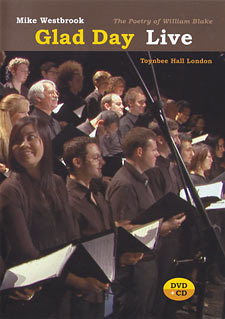
Glad Day Live - DVD / CD
The Poetry of William Blake
Mike Westbrook
Kate Westbrook
Phil Minton
Karen Street
Billy Thompson
Steve Berry
London College of Music Chamber Choir
Directed and conducted by Paul Ayres
Filmed and recorded in concert at
Toynbee Studios London
Saturday 6th December 2008
Kate Westbrook
Phil Minton
Karen Street
Billy Thompson
Steve Berry
London College of Music Chamber Choir
Directed and conducted by Paul Ayres
Filmed and recorded in concert at
Toynbee Studios London
Saturday 6th December 2008
1. London Song
2. Let The Slave
3. Lullaby
4. Holy Thursday
5. The Tyger and The Lamb
6. A Poison Tree
7. Long John Brown and Little Mary Bell
8. The Human Abstract
9. The Fields
10. I See Thy Form
2. Let The Slave
3. Lullaby
4. Holy Thursday
5. The Tyger and The Lamb
6. A Poison Tree
7. Long John Brown and Little Mary Bell
8. The Human Abstract
9. The Fields
10. I See Thy Form
Phil Minton - voice
Kate Westbrook - voice
Mike Westbrook - piano
Karen Street - accordion
Billy Thompson - violin
Steve Berry - bass
London College of Music Chamber Choir
Directed and conducted by Paul Ayres
Kate Westbrook - voice
Mike Westbrook - piano
Karen Street - accordion
Billy Thompson - violin
Steve Berry - bass
London College of Music Chamber Choir
Directed and conducted by Paul Ayres
Sopranos:
Emma Bailey, Helen Bailey, Cherish Bristow, Krasmira Enakieva, Lysa Fetke, Phoebe Fischer, Susan Gould, Xtai Gwinn, Lucy Hernades, Becca Kent, Jenny Minton, Malgorzata Piotrowska, Natalie Raybould, Jocasta Roper, Amanda Salvara, Sophia Sherif, Francesca Whitfield, Emily Ng Mun Yi
Altos:
Ariane Cammarata, Lucy Hewes, Honey Jamieson, Julija Kalnobricka, Charlene Ngese, Shizuka Noro, Victoria Robson-Capps, Fatma Salim, Claire Underwood
Tenors:
Harry Bagnall, Alberto Barret, Chris Cooper, Matt Garty, Malcolm Lauder, Tancredi Merlo, Tim Morgan, Lee Sabin, Daniel Sharples
Basses:
Raivis Buturovics, Sunil Glen, Len Merchant, Geoff Pearce, Kirill Polyansky, Geraint Williams
Emma Bailey, Helen Bailey, Cherish Bristow, Krasmira Enakieva, Lysa Fetke, Phoebe Fischer, Susan Gould, Xtai Gwinn, Lucy Hernades, Becca Kent, Jenny Minton, Malgorzata Piotrowska, Natalie Raybould, Jocasta Roper, Amanda Salvara, Sophia Sherif, Francesca Whitfield, Emily Ng Mun Yi
Altos:
Ariane Cammarata, Lucy Hewes, Honey Jamieson, Julija Kalnobricka, Charlene Ngese, Shizuka Noro, Victoria Robson-Capps, Fatma Salim, Claire Underwood
Tenors:
Harry Bagnall, Alberto Barret, Chris Cooper, Matt Garty, Malcolm Lauder, Tancredi Merlo, Tim Morgan, Lee Sabin, Daniel Sharples
Basses:
Raivis Buturovics, Sunil Glen, Len Merchant, Geoff Pearce, Kirill Polyansky, Geraint Williams
"That innovative and many-faceted British composer and musician Mike Westbrook - someone who shouldn't be shoehorned into the limitation of being seen as just a jazzman - has been setting the poems of William Blake to music for nearly 50 years. Some of these settings were originally commissioned by the National Theatre for the 1971 production of Adrian Mitchell's Tyger and the Blake settings, sung by Kate Westbrook and Phil Minton, were an integral part of the repertoire of the Mike Westbrook Brass Band from its formation in 1973. Bright As Fire, a programme entirely devoted to Blake's poetry, was first performed in 1980 and toured widely since throughout Britain, Europe, New York and Australis. This truly marvellous revisiting of 10 of Blake's verses was recorded by a small band consisting of four musicians and two vocalists, with a wonderful choral part conducted by Paul Ayres. Westbrook has always supplemented his own musical brilliance with remarkable musicians, and this recording is no exception, from the gypsy violin of Billy Thompson to the accordion of Karen Street, who sounds like a bal-musette on acid. Former trumpeter turned vocalist Phil Minton and Westbrook's wife Kate, who've worked with him for the past half-century, are on top form here. But the most powerful track is Westbrook's recitation of The Price Of Experience as the choir echoes Minton's earlier declaration that "everything that lives is holy." Most of the DVD tracks are duplicated on the CD where the mix, to my battered ears, sounded clearer than the video versions, although two of the CD tracks are of entirely different performances."
Karl Dallas - The Morning Star
Karl Dallas - The Morning Star
Excerpt from the DVD
"A wiser man than I called Westbrook's setting of Blake's poems as one of Brit jazz's greatest works. Originally developed as 'Tyger', Adrian Mitchell's musical about Blake, it in turn morphed into 'Glad Day' a TV musical drama. Created in pre-Thatcher, pre-crash days, it seemed a celebratory work of hope. Innocence even. But experience now re-casts it as a warning and heartfelt cry of passion. Blake's outcries against enslavement, chold exploitation, spiritual and economic oppression demand an audience now more than ever. Which all adds to the poignancy of a CD of a live recording paired with a DVD of the performance. The performance's unremitting intensity is beautifully caught by directors Mike Dibb and Jon Hiseman, mixing tight close ups with occasional wide shots of the choir. The black backdrop, with the band all in black but picked out by bright spotlights, sounds austere but it points up the battle between light and dark so central to these songs. The choir's youth, in angelic contrast to the band's embodied experience, is fantastic: like a theatre chorus they guide our emotion as they witness with awe Thompson's ecstatic anger on 'Let The Slave' or Street's lyric melancholy on 'Holy Thursday'. In a world that puts a price on everything, this music, this vision remains priceless."
Andy Robson - Jazzwise
Andy Robson - Jazzwise
Selected Recordings
Glad Day - Live
Three Into Wonderfull
The Nijinska Chamber
Cuff Clout
Selected Recordings
Says The Duke 2022
GRANITE
EARTH FELT THE WOUND
Says The Duke 2020
London Bridge Live in Zűrich 1990
KlangWeltReligion
Paintbox Jane
The School of Jolly Dogs
Contents:
Personnel:
Information:
DVD/CD Reviews:
order from
Order CD from Westbrook Records
UK ONLY
See below to purchase outside the UK
Other Westbrook CDs are available from
£12 inc UK P/P only
Unfortunately, we are unable to collect the appropriate taxes for purchases outside the UK on this website. To order from outside the UK please use BANDCAMP - click on the link below.

